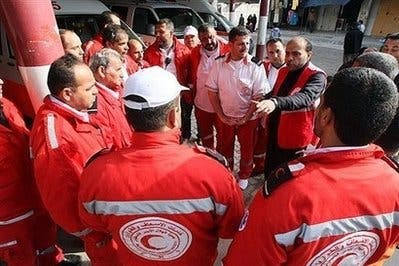Gaza humanitarian state “shocking”: Red Cross
Watchdog says "human rights crisis" in the region
The humanitarian situation in the Gaza Strip is "shocking", the head of the International Committee of the Red Cross said as Human Rights Watch slammed the Israeli blockade of the Strip as well as the Palestinian rockets fired into Israel in a new report.
"I saw this dramatic humanitarian situation. There are an increasing number of women and children being wounded and going to hospitals," Jakob Kellenberger told reporters in Occupied Jerusalem.
Kellenberger’s statements come a day after Israeli Prime Minister Ehud Olmert appointed a minister to oversee the coordination of international efforts to relieve the humanitarian situation the Gaza Strip.
The Red Cross president called for improved access for ambulances inside Gaza seeking to recover the wounded and to rescue civilians sheltering from the fighting, saying Israel's daily three-hour pause in operations is "not sufficient."
"It is a positive step that you have a three-hour stop in the fighting, for doing humanitarian work, but it is not sufficient," he said.
"Civilians who are being wounded, who are being trapped with problems of hunger, without water, you must be able to say that you can reach them."
Kellenberger -- who also visited the Israeli border town of Sderot, which has been hit by hundreds of Palestinian rockets since the war began -- urged both sides in the conflict to differentiate between militants and civilians.
He said medical supplies are holding up in Gaza, where over 1,000 people have been killed in heavy fighting and aerial bombardments since the December 27 launch of the largest-ever Israeli offensive on the territory.
"In general (medics) did not complain about the lack of equipment or materials," he said. "In fact there are a lot of goods coming in" although Israel has sealed Gaza off from all but humanitarian aid since the Hamas movement seized power in June 2007.
Kellenberger said he had seen "no evidence" of anyone wounded by phosphorous bombs, a weapon designed to deploy a smoke screen on the battlefield that Israel has been accused of using in civilian areas.
Civilians who are being wounded, who are being trapped with problems of hunger, without water, you must be able to say that you can reach themJakob Kellenberger
'Human rights crisis' in Palestinian territories: watchdog

Israel's blockade of Gaza, which had severe humanitarian consequences, and rocket attacks by Palestinians contributed to a "human rights crisis" in the region last year, Human Rights Watch said on Wednesday.
The U.S.-based international rights group's annual report for 2008 was compiled before Israel launched its current offensive against Islamist group Hamas in Gaza on December 27 in a bid to halt militant rocket attacks.
It charged that "Israel's comprehensive blockade of the Gaza Strip has severe humanitarian and economic consequences for the civilian population.
Restrictions on the supply of electricity and fuel crippled transportation as well as water-pumping, sewerage and sanitation facilities, it said.
Israel reintroduced a complete blockade in November in retaliation for a wave of Palestinian rocket attacks, cutting medical aid as well as food supplies and causing widespread power cuts, HRW said.
It also charged that between January and June 2008, Israeli forces conducting military operation in Gaza killed 388 Palestinians, about half of whom were civilians.
In the occupied West Bank and East Jerusalem, Israel "increased its extensive, often arbitrary restrictions on freedom of movement for Palestinians," making it difficult for many to access jobs, education or health services or visit family members.
The watchdog also condemned Palestinian armed groups in Gaza who indiscriminately fired rockets into the Israeli border town of Sderot and other civilian areas prior to the June ceasefire, killing four Israeli civilians and wounding others.
The rights group accused Hamas and Fatah of "extensive human rights violations" as they sought to impose their authority in Gaza and the West Bank respectively.
These abuses occurred in the period since Hamas took control of Gaza in June 2007, and peaked in July 2008 after a bombing in a Gaza City cafe killed a four-year-old girl and five members of Hamas's armed wing, the Ezzedine Al-Qassam Brigades.
"Qassam Brigades members, who have no law enforcement powers, arbitrarily arrested over 200 people. In the West Bank, Palestinian Authority security forces responded by arbitrarily arresting over 100 people considered sympathetic to Hamas."
Israel appoints aid minister
Ehud Olmert on Tuesday appointed a minister to oversee the coordination of international efforts to relieve the humanitarian situation in the war-ravaged Gaza Strip.
Olmert appointed Welfare Minister Isaac Herzog "to coordinate between the different government bodies in the humanitarian assistance to the civilian population in the Gaza Strip," his office said in a statement.
The move was aimed at "bolstering the humanitarian efforts in the Gaza Strip following requests by international bodies and states that have expressed concern over the developing humanitarian situation in the strip."
Israel's 18-day-old offensive against the Hamas-ruled Gaza Strip has devastated the impoverished enclave and led to a wave of international warnings of an impending humanitarian crisis.
Although its troops and settlers pulled out of Gaza in 2005, Israel still controls most of the crossings into Gaza which serve as a conduit for aid.
